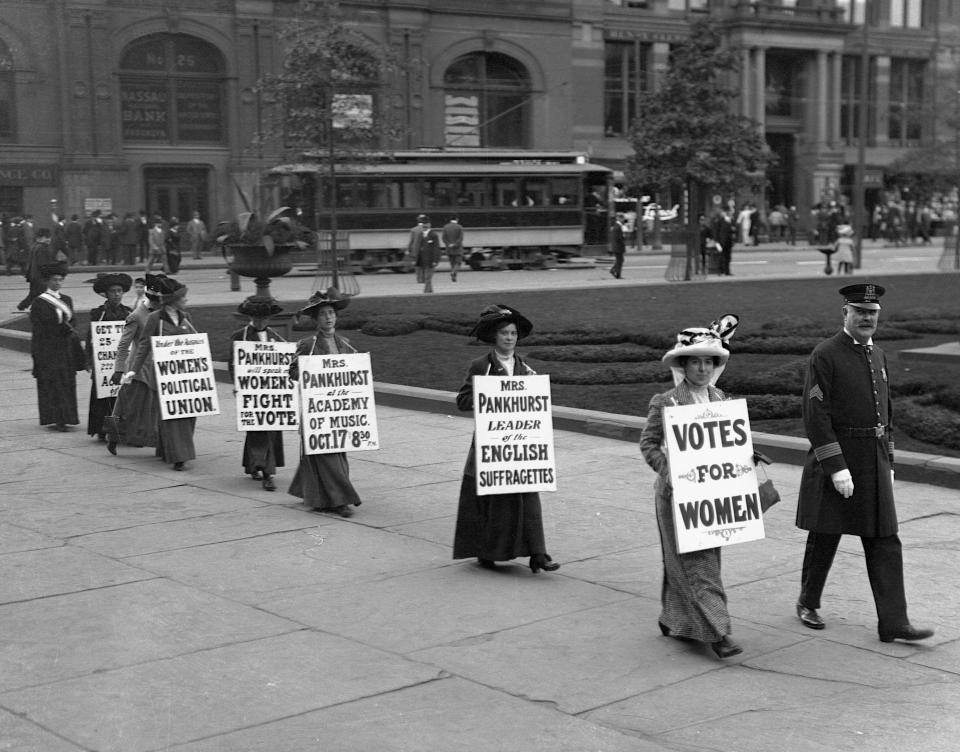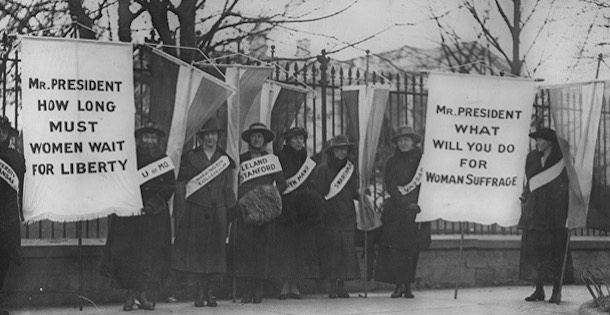
The celebration of Women’s History month is inextricably tied to the suffrage movement of the early 1900s. It was at this time that women began to raise their voices in opposition to the status quo.
In 1840, Lucretia Mott and Elizabeth Cady Stanton conceptualized a gathering where women could comfortably speak on the events of the day without condemnation, and away from the prying eyes of a judgmental society. Eight years later in 1848, a group of like-minded women convened in Seneca Falls, New York to discuss the issue of women’s rights. Here it was agreed that American women were autonomous individuals who deserved their own political identities. And with this convening, the suffrage movement and the fight for women to gain the right to vote in the United States was born.
Armed with the rallying cry “Forward Through the Darkness, Forward into the light” the suffragette movement began. Along with the reformers Elizabeth Cady-Stanton, Lucretia Mott, and Susan B Anthony; were women of all backgrounds that lent their voices to this movement including African American activists Ida B Wells and Mary Church Terrell; indigenous women like Marie Bottineau Baldwin; Hispanic suffragette Trinidad Cabeza de Baca and Asian activist Mabel Ping-Hua.
The women’s suffrage movement was a decades-long fight to win the right to vote for women in the United States. It took activists and reformers nearly 100 years, but on August 18, 1920, the 19th Amendment to the Constitution was ratified, enfranchising all American women, and declaring for the first time that they, like men, deserve all the rights and responsibilities of citizenship. The ratification of the 19th Amendment reflected the culmination of generations of work by resolute suffragists of all races and backgrounds. On Election Day in November of 1920, millions of American women exercised their right to vote for the first time.
The suffragette movement of the early 1900s was the precursor to The Women’s Rights movement of the 1960s and ’70s which fought for women’s freedom and equality. It upset long-established social norms and brought about groundbreaking changes in the American political and legal systems.


Women’s History Month commemorates the contributions of women to American culture and society; it has been observed annually in the month of March since 1987. It began when President Jimmy Carter declared that March 8 was officially the start of National Women’s History Week which lead Congress to declare the entire month of March as Women’s History Month. Since then, every president has continued to designate the month of March as Women’s History Month.
The theme of the 2022 Women’s History Month celebration is “Women providing healing, promoting hope”. It pays tribute to women of all cultures that have provided both healing and hope throughout history. This year’s theme is particularly poignant given the COVID pandemic
During the month of March we celebrate those “glass ceiling” breaking women like VP Kamala Harris; Kalpana Chawla, the first Indian American astronaut; Chloe Zhao, the first Asian female to win a Best Director Oscar; Hillary Clinton, the first female Democratic Presidential nominee and Sarah Palin, first female Republican Vice Presidential nominee; those labor and Civil Rights activists like Rosa Parks and Delores Huerta; and LGBTQ activist Sylvia Rivera; scientist Kizzmekia Corbett, who helped develop the Moderna COVID vaccine and countless other history-making women in the arts, entertainment, politics, and sports. Currently, we are on the cusp of witnessing the first African American women, joining Justices Keegan, Sotomayor, and Barrett, as a Supreme Court Judge!!
Here’s to continuing to celebrate the achievements of American women and making HERstory!
Important dates in Women History
- The first major march on Washington by suffragists happened on March 3, 1913.
- The National Woman’s Party was formed in March 1917. The group was dedicated to getting women the right to vote.
- Title IX was passed on March 1, 1972. In fact, the first-ever Women’s History Week was created in order to bolster support for Title IX, which prohibited discrimination due to sex in federally funded education programs.
- The Equal Rights Amendment was passed in the Senate on March 22, 1972.